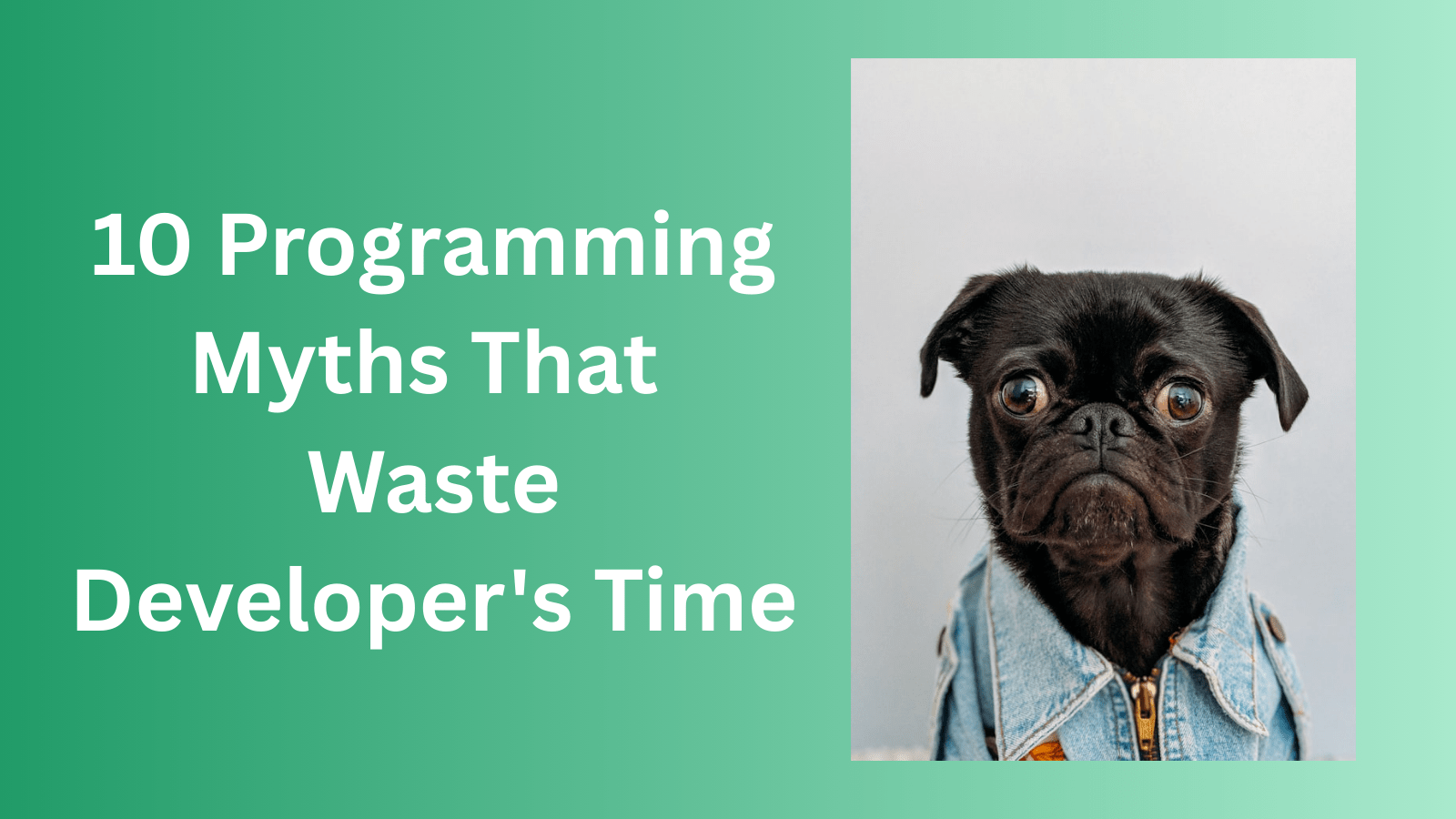What's Holding You Back
When you try to memorize every function instead of understanding how things work, you slow your progress.
When you treat every bug as a personal failure, measure productivity by how many hours you code, and copy-paste without understanding, you don't just fall behind.
Rather, you sabotage your long-term progress and miss the chance to become the real problem solver you're meant to be.
So whenever you feel stuck while writing code, it's not because you aren't smart enough, it's usually because you're following some outdated best practices myths.
So whenever you feel stuck while writing code, it's not because you aren't smart enough — it's often because you're following outdated myths instead of best practices. For example, knowing how to set up a virtual environment can free you from confusion and wasted time.
Most of us start out believing things that sound helpful but actually hold us back. From hours of debugging production issues to navigating outdated documentation, slow review cycles, and unclear expectations, you might think all of this is just part of the job.
But what if some of these struggles are avoidable? What if it's mostly a myth on programming that we never questioned?
Myths don't just build pressure, they create mental blocks that hold you back from real progress.
This article will help you identify those myths, understand why they're harmful, and give you clear, practical ways to avoid them.
Bonus insight: If you're currently scaling apps or planning for production, don't miss this deep dive on scaling Django for high-traffic applications.
10 Programming Myths That Waste Your Time and Energy
Myth#1 : "Real developers don't need to Google"
The reality check: Everyone, Google, even the most experienced developers, searches online for syntax, docs, or solutions. No one remembers everything, online tools are part of the job.For official tools, APIs, and best practices, developers can always refer to the Google Developers portal for up-to-date and trusted resources.This can significantly improve a developer's workflow by providing structured guidance and reliable documentation.
The escape route: Normalize searching and think like a problem-solver - not by memorizing but by understanding the root cause of the problem to find a better and lasting solution.
You should build habits around exploration and stop guilt-tripping yourself from using online resources. Development isn't a memory test for real developers but mastering how to ask good questions and search solutions fast - that's a real developer skill.
Myth#2: "You must master every language to be a great developer"
The reality check: You don't need to know every language, you need to have in-depth knowledge in one language that outweighs the surface level knowledge of ten languages.
You will always feel behind and overwhelmed if you continuously chase every new language.
You can't master everything, it's better to be valuable in one stack than average in many.
No matter what the internet tells you, being a great developer doesn't mean you need to know everything.
Instead, it's about knowing enough to solve problems efficiently.
The escape route: Focus on only one language and build expertise that you only can solve in a fast way.
Invest in crafting powerful and dynamic projects in one language, one framework, and one workflow over one hundred languages.
Learn others only when you need them and dedicate yourself to creating strong fundamentals that transfer across various languages.
Always hang on to go to the depth of the language, not widely to every language.
Myth#3: "More lines of code mean better productivity."
The reality check: When you code more, it often means more bugs and maintenance, but the truth is A 10-line function that works is far better than a 100-lines that confuses everyone. In light of this, code quality > code quantity.The best developers write code less to achieve more efficient, clean code.
They invest value in the quality of the solution, not in volume.
The escape route: You should write code that is clean, well-maintained, and purposeful. Value the outcome not the output because solving the problem matters more than how much code you wrote.Let your code make problems easier to solve, not harder to trace by refactoring regularly. Keep in mind to maintain code short, sharp, and self-explanatory to strive for elegance, not bulk.
Also note: Developers who are looking to supercharge their workflow and code smarter should explore the Top 5 Vibe Coding Tools in 2025 for Developers — a curated list of innovative tools shaping the future of development.
Myth#4: "Debugging means you're bad at coding
The reality check: If you think debugging makes you a bad coder, then you haven't met the best coders who are excellent at debugging. Debugging isn't a solid proof that you are messing up, it's actually a proof that you're building something real.
Every developer spends time debugging means it's not a sign of failure, it's a core part of the job that makes you a more skilled, stronger, and resilient developer. So writing code without debugging is a myth in itself that is a holy grail of coding.
The escape route: Shift your mindset in treating debugging as a skill, not a setback as it sharpens your problem-solving skills and makes you a more proficient developer. If you rush to fix the code, it will make you more confused and work you harder.
So try to explore, observe, and understand how things work because there's nothing to be ashamed of becoming a curious person who wants to be the best developer. Debugging trains you to see how system works and that's the real power of debugging.
Myth#5: "You're only as good as how fast you can code"
The reality check: If you think fast coding equals the skill of a great developer, then you are probably wrong because fast coding often leads to careless bugs, poor structure, and technical debt.
Speed looks impressive, but in real, experienced developers know that thoughtful and readable code matters in most cases.
When you type fast, you actually type with a mix of accuracy and errors. Speed without understanding just means faster mistake.
The escape route: Whenever you are starting to write code, slow down to understand the problem first and then code because a few minutes of planning can save hours of debugging.
So if you want to be one of the great developer, write less and think more to creat clean and scalable solutions.
Measure progress by how well your code holds up, not how quickly your wrote it. Long term progress isn't built by rushing, instead it's built by steady effort and dedication.
Myth#6: "Using frameworks makes you a lazy developer"
The reality check: Frameworks exist to save time, reduce reputation, and help you follow best practices - here's a full breakdown of why frameworks matter in programming So don't think that using frameworks means you are not a "real" developer.
Not to mention, ignorance of framework isn't the issue, ignorance of how they work is.
Real productivity means building smarter, and frameworks are part of the toolbox.
The escape route: Learn the "why" behind abstraction, then use it to build better, faster, and cleaner projects. Focus your creativity on unique logic, not boilerplate.
Prioritize using frameworks wisely to focus on solving business problems, not rewriting boilerplate code. Understand the core concepts beneath the framework, it will benefit you when debugging complex issues.
Myth#7: "If you're not coding everyday, you're failing behind"
The reality check: Perfect code doesn't exist but perfect functionality does! Obsessing over it is just procrastination in disguise that only hinders productivity and keep you stuck in a cycle of overthinking.
Users don't care about elegant internals, they care about working solutions that their lives easier. Your focus should be on usability, and functionality to deliver seamless user experience over time.
The escape route: Write code that is functional and maintainable like a real world developer do. Aim for clean enough to keep the codebase sane and enable efficient debugging.
Deliver value early, then iterate for adaptability and relevance. Stay sharp on shipping, learning, and refining to stay ahead of the curve and deliver consistent value.
Myth#8: "If it's hard for you maybe you're not meant for this"
The reality check: Most of the developer face challenges, regardless of skill level. Difficulty doesn't mean that you're doomed to struggle, it means you're pushing your limits and stepping out of your comfort zone.
The one who stays committed, one day will reap rewards and inspire others with their accomplishments. Failing often doesn't predict inability, but mostly your growth
The escape route: Think differently to enable yourself for more opportunities because life complicates if you are stuck in any programming paradigm. Don't compare your struggles with others' success because it will somehow undermine your motivation.
Break problems for better understanding and ask for help if you're lost in any programming concept. Get it in your head that persistence beats brilliance.
Myth#9: "You need to understand the whole codebase before contributing"
The reality check: Understanding comes from contributing, not from reading thousands of theories. No one fully understand a large codebase, not even a senior developer.
If you wait until everything makes sense, then you will be stuck in analysis paralysis. It will stifle your creativity and impede your success by the weight of overthinking.
The escape route: start with small steps to create lasting habits. Focus on fixing a typo, test a minor bug, or trace a feature because these small fixes make you understand the whole database with time.
Engage yourself to consistent practice to reach to the excellency. Embed yourself in innovation to achieve distinction as the best developer.
Myth#10: "If your code works, you don't need to refactor it"
The reality check: We developers are so focused on getting things to work that we often believe, “if it works, it works — no need to touch it.”But in reality, the code is a living, evolving system that can slowly turn into a mess if left without refactored.
"Great code is written for humans to read and change, not just for machines to run". We should not optimize prematurely to satisfy performance myths at the cost of clarity and maintainability.
The escape route: Make refactoring a regular habit because it improves code quality and reduce technical debt. Use principles like DRY( Don't Repeat Yourself ) to avoid code duplication and maintain readability.
Treat code reviews as a chance to learn from others and share knowledge. Run linters, use static analysis tool, and write test for critical functionality and error detection.
Break The Loop
These myths are so prevalent that even I have also suffered most of these myths despite having extensive experience. That's why I always recommend questioning common beliefs because they often disguise poor practices as wisdom, and breaking free from them is crucial for better clarity, confidence, and long-term growth.
Whether you're just starting out or years into your development journey, you should always challenge what you've been told to uncover what actually works for you, and stay curious to evolve with the tech and not get stuck in outdated mindsets.
For example, many developers assume all hosting solutions work the same, but choosing the right one can impact your app’s speed, scaling, and security—this guide on the top Django hosting providers breaks down the pros, cons, and pricing to help you make smarter infrastructure decisions.
If you follow consistent and mindful habits, you will definitely overcome unnecessary struggles and get to the level of confidence and the version of yourself you always wanted to become.
Drop a comment and let me know the programming myth you believed for too long and now you're choosing to break free from !



